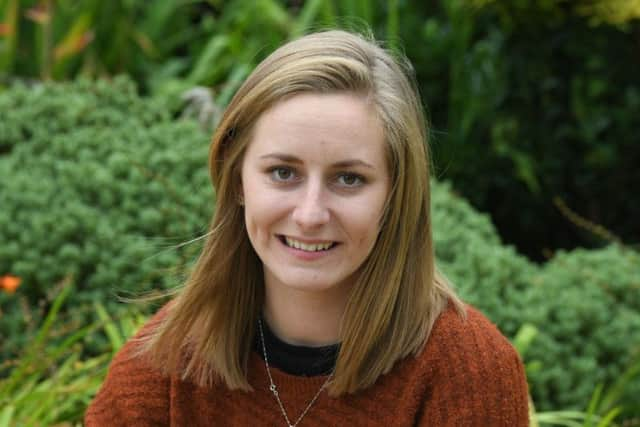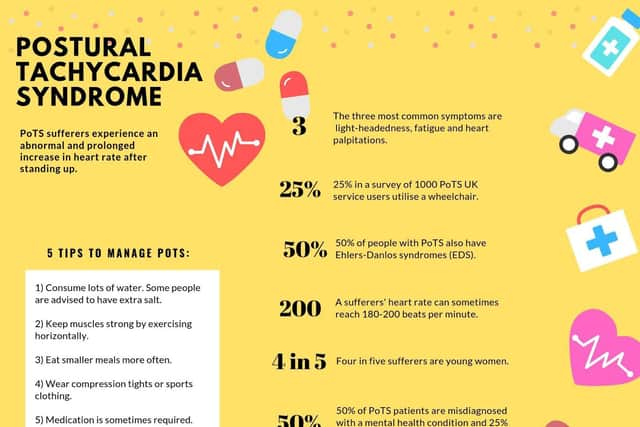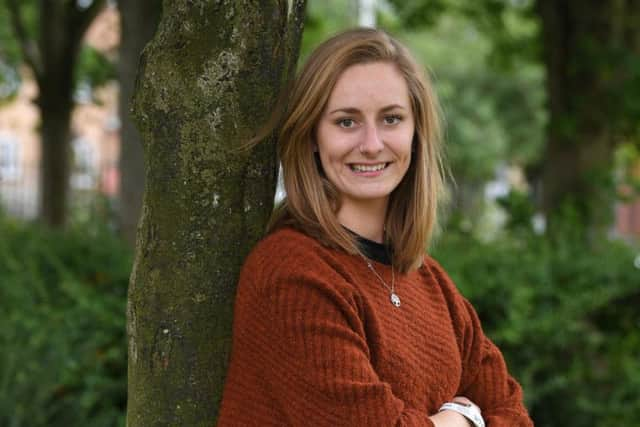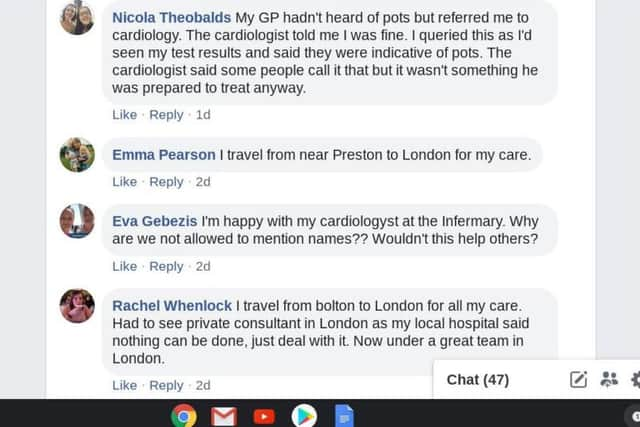Why this Leyland woman is highlighting the invisible illness that made her faint six times a day


Now Beth Joyce is raising awareness of the condition that gave her anxiety and depression by hosting Par-tea For PoTS at Valley Coffee, Valley Church, in Fourfields, Bamber Bridge.
The event will raise funds for charity PoTS UK and mark the country's first official PoTS Awareness Day on Friday, October 25th.
Advertisement
Hide AdAdvertisement
Hide AdSufferers of Postural Tachycardia Syndrome (PoTS) experience an abnormal and prolonged increase in heart rate after standing up. It is often found in those with an autoimmune condition (occurring when the immune system attacks healthy cells), follows a virus like glandular fever or sometimes presents in pregnancy.


Symptoms occur when the body is unable to adjust to gravity, and include fatigue, light-headedness, heart palpitations, sweating, nausea, fainting and headaches.
Beth (27), a supervisor at Valley Coffee, said: "Being diagnosed with and coming to terms with PoTS has been one of the hardest, life-altering things I have ever had to deal with. However it has shown me just how strong I am as a person to come as far as I have despite the daily difficulties that I continue to face."
Pneumonia struck Beth down when she was a 19-year-old graphic arts student spending her university summer break working behind a bar and promoting a scuba diving centre in Corfu.
Advertisement
Hide AdAdvertisement
Hide AdBack home and disappointed the summer had been cut short by illness, she turned her focus back towards her second year of university.


But things took a turn for the worse when she developed daily headaches, heart palpitations, brain fog and uncontrollable dizziness. And when she began to faint without warning, sometimes as often as six times a day, causing injuries like fractures, bruises and black eyes, she knew something was seriously wrong.
Once a keen rock climber and boulderer, Beth was unable to stand without fear of fainting and was so terrified of it happening in public that she became house-bound.
"It was really scary because I never knew when it was going to happen and I'd end up banging into things or knocking my head and one time I even fell onto a cactus," Beth said.
Advertisement
Hide AdAdvertisement
Hide Ad"I didn't want to be out and about in case it happened and I shut myself off completely. I'd only go to places close by with a friend. I couldn't even go to university and missed out on a huge part of my education.


"I started to suffer from depression because it was upsetting and I felt lonely."
But when she went to the doctors, her GP put it down to both her age and tiredness.
"I'm very grateful my friend wouldn't leave it at that and dragged me almost kicking and screaming back to the doctors," she added.
"But this time my GP said it was all in my head."


Advertisement
Hide AdAdvertisement
Hide AdDr Lesley Kavi, GP and PoTS UK chair, said approximately 50% of sufferers also have a genetic disorder called Hypermobile Ehlers-Danlos syndrome (EDS) that causes fatigue and painful unstable joints.
She added: "PoTS can be very disabling and it massively affects quality of life, on the same level as COPD. Many sufferers can't work, go to school or attend university. They feel terrible every time they stand up yet many struggle to get benefits because they don't look ill. The condition is misunderstood and some people think it is a trivial condition you can grow out of."
It takes seven years on average to get a diagnosis, with many people ending up in A&E in the meantime, according to Dr Kavi, as many doctors don't know about PoTS. It was only properly defined in 1993 and is sometimes still missing from medical school curriculum. And when the professor gave talks in Manchester and London, only 10% of around 200 GPs in each city had heard of it.
She added: "Patients are told they are anxious, depressed or hypochondriacs. Many who are batted around the health service end up being convinced it's in their head as they are told this so often. Others give up trying because they're tired of being labelled. It's awful. I hear these heart-wrenching stories. Sometimes getting the correct diagnosis makes a big difference."
Advertisement
Hide AdAdvertisement
Hide AdBeth was both encouraged and devastated by her diagnosis. After going back and forth to her GP, she was finally referred to hospital where she saw a specialist PoTS nurse on a cardiac unit. She underwent blood pressure checks, heart scans called electrocardiograms (ECG) and a gruelling tilt table test which forced her to faint, and confirmed she had Viral Onset PoTS.
She said: "It was a big relief to know it wasn't all in my head and something could be done about it. But it was also terrifying because it was life-altering.


"When the doctors first told me I didn't say anything for a long time and then while I was waiting for my prescription it all hit me and I thought, 'I'm going to be doing this every month for the rest of my life. I broke down in tears because I knew my whole life was going to change at such a young age."
An uncertain future in which she might never be able to drive or work again brought on depression and anxiety. Her recovery was long and slow, and her medication came with unwanted side effects.
Advertisement
Hide AdAdvertisement
Hide AdDr Kavi said: "It's even harder for children. Many UK specialist are not permitted by the hospital management to see them if they're outside their local area and send them back to their GP. They say all local services should be able to manage the issue but that's simply not true. They're shedding responsibility.
"The problem is particularly bad in the North-West. As far as I'm aware, there's not a specialist in Preston."
The charity wants GPs to be trained to help sufferers locally and is losing its fight with both the Government and NHS to alternatively provide national PoTS services.
Although the Department of Health admitted existing services may be failing PoTS patients, it ultimately rejected the charity's requests in its recommendations to ministers.
Advertisement
Hide AdAdvertisement
Hide AdA report by the Prescribed Specialised Services Advisory Group (PSSAG), said: "PSSAG recognised that awareness of the condition was low and that people with PoTS may not be served well by existing services as the clinical problems could cross several different disciplines.
"However, PSSAG felt that better access to high quality autonomic function labs that could investigate those who are referred with the symptoms might be of greater benefit to patients, rather than national commissioning by NHS England."
Beth said she is one of the lucky ones - despite now taking seven daily medications - because her diagnosis came quickly.
"I'm on a lot of medication for a 27-year-old - I've got quite the pharmacy," she added.
Advertisement
Hide AdAdvertisement
Hide Ad"But I didn't want to be the person who was ill so I only told my family and a few close friends.
"There was a chance I'd have to postpone my final year at university until I had the condition under control but everything was changing for me so I wanted to finish it and I did. It was one of the most terrifying but amazing things walking out on that stage on graduation day because I was scared of fainting but my friends were saying, 'You've got this.'"
The lack of help - even globally - has inspired Vicky Nash, the charity's North West trustee, to set up the annual awareness day.
She said: "POTS sufferers have never had their place on the map and a lot of them are suffering in silence.
Advertisement
Hide AdAdvertisement
Hide Ad"I've found it rare to find a cardiologist with an interest in the condition and getting a diagnosis was difficult for me. My old GP didn't pick up on anything, even though I was going back and forth.
"If we can put the condition on the radar, then hopefully in the future people will know October 25th is Purple for POTS."
Beth's event will offer cupcakes, afternoon tea, live music, face-painting and games while Blackpool Tower and Fleetwood's Marina Hall Theatre will be lit up in purple.
To organise your own Par-tea for Pots event, visit www.potsuk.org for a fund-raising pack.